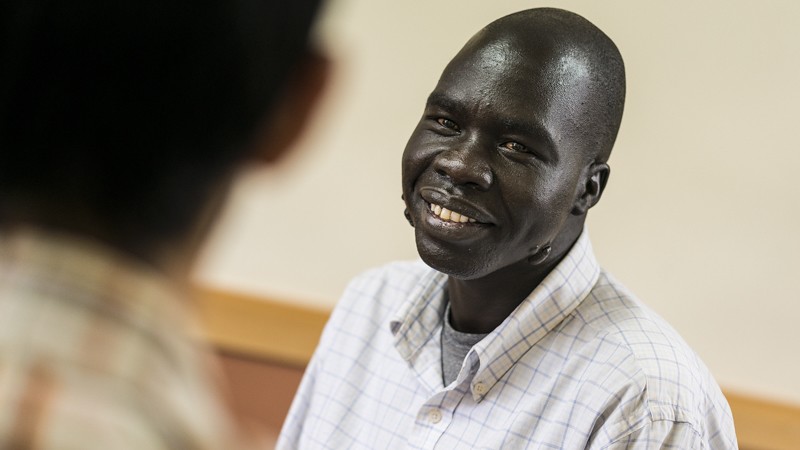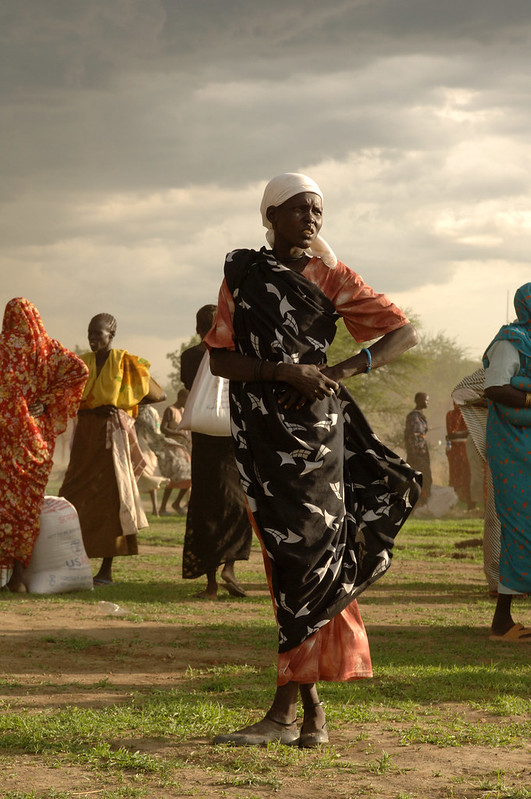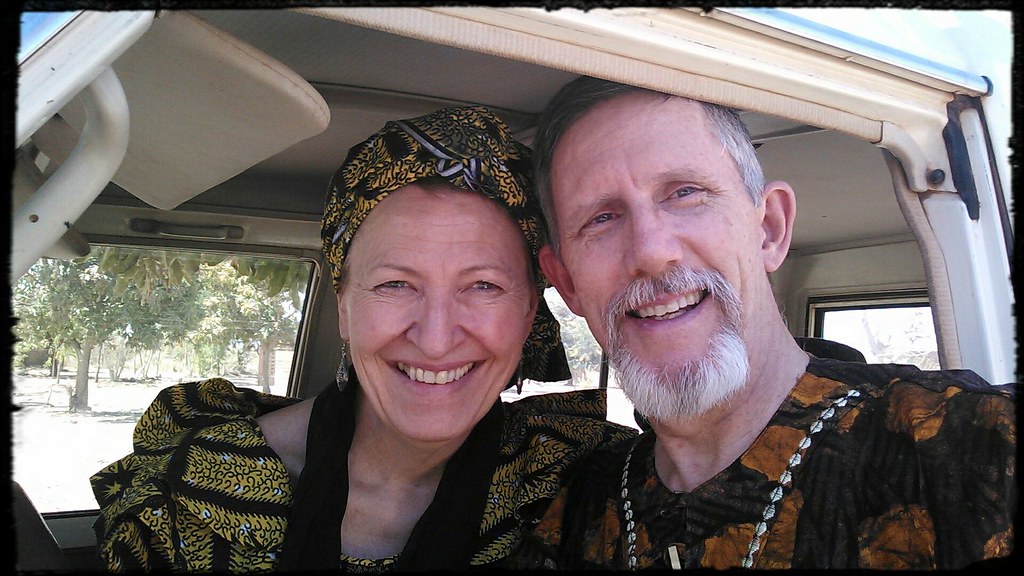A child of war becomes a man of peace
By Tim Coleman | Sudan and South Sudan in East Africa

Joseph was conscripted to the Sudan People's Liberation Army when he was barely six years old. Photo by Tim Coleman.
Notice: This story contains graphic content and images some may find disturbing.
Joseph Kur was a boy soldier in the Sudanese Civil War, both witnessing and committing terrible acts while still a child. By the grace of God, today Joseph is a committed Christian, living in Nairobi due to the unrest in his homeland and forging a future for himself. He dreams of becoming a pastor, and has been in close touch with the Serving In Mission (SIM) South Sudan team for the last few years.
"They came in the night - five men in all. We were beaten on our backs, on our arms and on our legs. They used a leather whip and we had no choice but to go with them.
"They told us we had to fight against the Sudanese government to save our land and to be free. They told us that the government was run by Arabs, who would take our homes and our cattle and force us to be second-class citizens."
Joseph Kur remembers it well, that night he was abducted and forced to join the Sudan People's Liberation Army (SPLA). His childhood was wrested from him and the barely six-year-old boy began his descent into the violence of Sudan's civil war as a soldier in the SPLA.
Life had already begun to change for Joseph and his family though. His mother had left their home village of Adong for the Sudanese capital of Khartoum, taking Joseph's siblings with her - four older and two younger. Joseph had stayed behind, and he has not seen any of them since.
"I didn't want to go," Joseph explained. "I wanted to stay with my father and my uncle, who were desperate to stay in what was a Christian area rather than go to Khartoum, which was very Islamic." It did not matter - he was forced to leave anyway.
That night, he and a couple other young boys had been staying with his uncle. He did not know where his father was. "Just a couple of days before I was taken, I'd heard they'd already forced my father to join them," Joseph said. He and several other boys were taken to Itang in Ethiopia to live in a makeshift camp that was part military training centre and part refugee housing.
Training for a life of war
Once there, they were prepped for war. They were forced to eat three large meals a day; in a part of the world where food is often desperately short, they were beaten if they did not finish their meals. "I think there were about 3,000 boys there," Joseph said. "We were all given maize porridge and lentil stew and told we had to eat everything.
"We didn't really understand what was going on and wondered constantly if we'd done something wrong to end up in a place like this. I remember feeling that my whole life was over and that I had no future. But whenever we asked questions, we were told we had to grow up quickly so that we could help them fight the government.
"At least in Ethiopia we had food and clothes, because UNICEF was there. We thought if we did as we were told, we would end up in good schools and a better life."
But after only two months, Joseph was transferred to the military training camp at Bilpham. There he endured a brutal regimen of rigorous discipline; training began early in the morning and lasted for hours.
"Sometimes we would be forced to go on long marches of up to seven hours so we could get used to walking long distances," he said. "They warned us that it could take up to three months to walk to the places where we would be fighting."
"We were taught how to use an AK-47 rifle. We were shown how to take it apart and how to reassemble it; how to aim and shoot. We were shown how to take cover, how to remove injured people from the front lines and how to move back when your bullets are done.
"We used to train in groups of 12. When the commanding officer clapped once, we had to make two columns; when he clapped again, we had to file out into a line and prepare for battle. When we heard him fire the first shot, we all started firing.

Joseph underwent intense training with the SPLA, learning combat maneuvers, practicing how to use weapons and building up stamina to walk for hours.
Photo courtesy of United Nations Photo.
"On the days when training was finished by lunchtime, we had school lessons for two hours in the afternoon, but we were taught by the officers, not by proper teachers. We didn't have paper or pens; we just wrote on the ground using our fingers in the dust. I had just one book - it was a Tom and Jerry cartoon book.
"We were taught some basic writing and arithmetic, but the officers used to tell us that being in school and shooting guns were the same thing. I hated that, but when I asked my commanding officer if I could go further in my studies he wouldn't let me."
Joseph's value to the SPLA, after all, lay in his ability to fight, not in his ability to learn and think for himself. And there was no escape from the army's total control.
"If you tried to desert and were caught, you would be executed," Joseph said. "During the morning parades the list of deserters would be read out as a deterrent for anyone thinking of leaving.
"We wondered constantly if we'd done something wrong to end up in a place like this. I remember feeling that my whole life was over and that I had no future. But whenever we asked questions, we were told we had to grow up quickly so that we could them fight the government.”
"We were beaten for the smallest mistake, and I must admit there were many times I thought that taking my own life was the only way out. It was only because of the counsel of my friend, Garang, that I didn't go through with it."
The one moment of hope at Bilpham came when he was briefly reunited with his father, who was being forced to train in a different part of the camp. His father had been a Christian minister and elder in the Lutheran church before he was also forced to join the SPLA.
"I remember running towards him and crying out to him," Joseph said. "We hugged and were allowed to spend some time together. My dad sat with me under a tree and prayed for me, telling me God would look after me."
War is hell
Joseph was issued a uniform, gun, water bottle, belt, a pair of shoes, a blanket and one set of ordinary clothes. Each boy soldier was assigned to a particular state. Joseph was sent to Eastern Equatoria, where he served alongside his father in a small company of around 30 soldiers - five or six men and 25 boys of varying ages.
If he thought his six months of training were brutal, it was nothing compared to the savage reality of war. They were forced to walk to the combat zones, often walking for five hours in darkness, sleeping sitting up for just one hour, and then walking for another five hours across miles and miles of grasslands.
If they walked by day, they would start at 6 a.m. and not stop for food until 3 p.m. Usually, those carrying food and the cooking equipment would march ahead, and those with the ammunition followed. They seldom had clean water.
Then there were the actual battles, when father and son fought as brothers in arms. Still, whenever they fought, Joseph's father would always make sure he was near his young son. During one battle, the company was being overrun by two enemy tanks and they were forced to retreat. Joseph, just ten years old, couldn't carry his gun and keep up. His father put Joseph's gun on his own back and urged his son to run faster.

A truck full of SPLA soldiers in South Sudan.
Photo courtesy of Enough Project.
He and his father fought many battles together, but one battle will forever remain etched in Joseph's mind. He remembers marching out one Sunday night with his father beside him. They lay in wait all night long. At dawn, battle erupted. They fought all morning, hiding to avoid sniper fire and gradually moving forward into enemy territory.
At around 2 p.m. his father was hit by a bullet and went down. Joseph clung to him, cradling his head. With no medics nearby there was no hope of rescue or survival. Joseph could only weep as his father died in his arms.
"I begged some of the other soldiers to help me carry my father's body away from the front lines but they all refused," Joseph said. "In the end, I found five of my friends who agreed to help me.
"Two of them helped me provide covering fire as the rest dragged his body out of the battle zone and back to headquarters. We buried him later that day."
Finding hope
"I couldn't understand why God would allow my father to die and my family to disappear," Joseph said. There were many times during those dark days that Joseph became angry with God, crying out, "Why are you doing this to me?"
"I despaired of never finding an answer. I asked God why and told him that if there were a reason, then so be it, but if there were no reason, I would kill myself," Joseph said.
"I actually got as far as looking for the rope to hang myself and then searching out a place where I could tie the noose. I thought I had no way out.
"Garang came in and told me not to kill myself. He said I should plan for the future and try to help those around me. He said there were ten-year-old boys dying in this war and that they had no one to tell them the Gospel. He said I should try to preach to them and try to help them get out of the war.
"I took the rope and burned it. I told God I would never think of doing that again. I asked him to help me do whatever he wanted me to do. I had a small Bible that had been given to me by the army chaplain. There was no one to teach me, so I started to read the Bible on my own."
Joseph often questioned his faith. He doubted he had the strength to keep believing in Jesus, but after reading about people in the Bible like Job, he knew he had to stand firm. Amid the terrible grief of his father's death, Joseph once again made a commitment to follow God in all circumstances. The more he read his Bible, the more he realised that Jesus was the only person he could trust.
Joseph went on to fight in two big battles, as the SPLA struggled to gain independence for South Sudan: the battle for Bilnyang in late 1992 and early 1993 and the battle for Kapoeta between November 1994 and April 1995.
During the two-week climax of the Bilnyang conflict the fighting lasted from 6 a.m. until 4 p.m. The SPLA struggled to hold a strategic route to the capital of South Sudan, Juba. Every morning, government forces battered the SPLA stronghold with heavy artillery and bombs from their Russian-made Antonov planes, before launching ground attacks.
"In a battle like this there was no one to come and rescue us," Joseph said. "Whenever there was a break in fighting, we would gather up dead bodies and pile them up around us so we had somewhere to hide from the bullets.
"Just the smell of the dead was enough to stop us sleeping properly or eating. If we did manage to doze off, we would dream of being in the middle of the dead. Sometimes, we would have food brought to us at night. In the terrible confusion of night and fear and death, some of us even ate human flesh."
More than 1,000 of Joseph's comrades lost their lives in the battle for Bilnyang, which the SPLA eventually lost. Joseph still believes those who were killed in battle were the lucky ones.
"You didn't want to be captured by the enemy," Joseph said. "They would kill you slowly by removing your limbs one by one. We found one of our soldiers who had been dismembered like that and it was an awful sight.
"Our ammunition magazines held 30 bullets, but you made sure you used just 29 so you could keep one for yourself if you were going to be captured. It was better to kill yourself."
It was at Kapoeta that he saw his close friend, Gieth, shot through the heart as he fought against the government forces. There was no time to bury his body.
Release from the army
Joseph begged his commanding officers to release him from the army and allow him to return to civilian life. But time and again they refused, forcing him to move from outpost to outpost across South Sudan - from Rumbek to Torit to Kapoeta and on to Chikudum.
It was there that he again asked to leave the army. At first his commanding officer said no, but when an old friend of Joseph's, Riak, joined in this plea, they were able to persuade him to say yes. Joseph was granted his release in 1996. Riak was allowed to go with him, and together they travelled by bus to the Kakuma refugee camp in northern Kenya. After making sure Joseph was safe, Riak returned to the army.

These women are amongst the thousands of internally
displaced people who fled their homes during the civil war.
Photo courtesy of United Nations Photo.
Joseph was registered by UNICEF at the camp, and given food and space in a small tent. He was sent to a rudimentary school where, for the first time in his life, he was able to write on paper. The camp was in a harsh desert where temperatures soared to 45 degrees centigrade - but it was safe.
Water and medical treatment were provided, and the daily regimen was always the same. School lasted all morning, but there was little else to do to pass the time. The men and boys queued for food every day before cooking a single meal, typically ugali (a rice maize porridge) and beans, at around 3 p.m. It often fell to Joseph to do the cooking for himself and his two tent-mates.
They had little freedom of movement. People outside the camp were often unfriendly or even hostile. Even inside there was tension between the Dinka and Nuer communities, with frequent fights between tribal gangs. Those who wanted to stay out of trouble went from tent to tent, meeting friends and wiling away the long hours with dreams of home. They sat and talked about history, or about their plans for the future. All the while, Joseph clung fast to his dream of Christian ministry, a dream he inherited from his father.
He made a couple of good friends in Kakuma, especially Ngor Mobil. Ngor had been staying in Ethiopia, but was forced to flee when the government changed in 1991. He tried to return to Sudan but the war stopped him, and he returned to Kakuma in 1992. Another friend, Awor Deng, lived in Kapoeta until the Sudanese government captured the town and she was forced to flee to Kakuma.
Kakuma was Joseph's home for four years before he decided to move to another refugee camp, Dadaab, in the east. From there, he managed to make it to Nairobi, where he stayed with a family who were sponsoring several refugees. Eventually he managed to scrape together enough money to take a psychology and trauma counselling course at Grace School.
Joseph said, "I persuaded the school to give me a huge reduction in the fees, and borrowed the money to go. The course really helped me deal with the trauma I had been through and I hope to be able to use my knowledge to help others."
Joseph now lives with a mission family who provide both his food and accommodation. He is very much part of the family, helping out around the house and with anything else he can. He has taken part in trauma training workshops and intends to help his fellow South Sudanese exiles in Kenya by running similar courses for them.
Since arriving in Nairobi, he has attempted to find out what happened to his mother, brothers and sisters. So far, he has discovered no trace and does not know whether they are dead or alive. He struggles to find enough money to even travel around Nairobi but is still determined to fulfill the dreams his father had for him to go into Christian ministry.
"Just a week before he died, my father told me that whatever I do in life I must serve God and his church," Joseph said. "Maybe I can be a pastor and serve God in that way."
A life devoted to that ministry would be one of proclaiming peace, not war; of bringing reconciliation, not conflict. Moreover, it would be a calling he was not forced into against his will, but rather, one born of the hope and faith he found in God during his darkest days. Perhaps this is why Joseph holds fast to it.
"I desperately want to see my father's vision come true," he said.
Related stories

From Bible college student to Bible college Director
Joseph now trains pastors of the future, with help from one of his old teachers in West Africa. The joy and lasting value of Christian leadership training is epitomised by the long-term relationship between an SIM mission couple and a West African Bible college director.

Young women from rural Peru find discipleship and belonging in the city
As rural young women move to Peru’s cities for study or work, they face a world full of pressure, distraction, and isolation. Mission worker Lizzie is walking alongside them; offering friendship, discipleship, and a reminder of their worth in Jesus.

In Carrie’s classroom, Jesus is shaping hearts and minds for his kingdom
When mission workers with young families leave their home country, a major concern is how their children will get on. While the parents are out serving, the kids need stability, education, and spiritual nurturing. That’s where teachers like Carrie come in. Originally from Kansas, Carrie now teaches at a mission school in Liberia, part of Dakar Academy in Senegal, shaping young hearts and minds for God’s kingdom.

